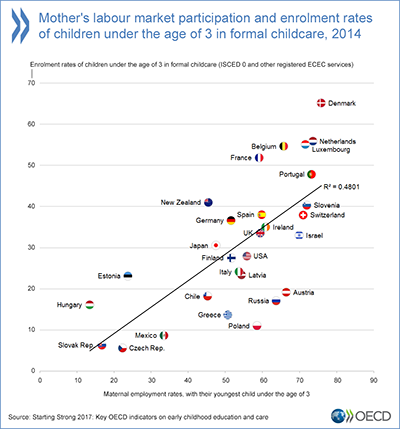Improve early education and care to help more children get ahead and boost social mobility
Countries should step up their efforts to provide affordable and high-quality early childhood education and care (ECEC) to improve social mobility and give all children the chance to fulfil their potential, according to a new OECD report.

finds that most governments have increased their investments to expand enrolment and open more daycare centres and schools in recent years. It notes that countries should next focus on improving the working conditions of teachers, ensuring equitable access for all children and introducing new teaching methods.
Every child benefits from high-quality ECEC. Evidence from PISA 2015 reveals that in almost all OECD countries, 15-year-olds who had access to ECEC outperformed students who had not. Disadvantaged children benefit the most and targeting them would generate the highest returns, says the report.
“Giving all children access to high-quality early education and care will lay the foundations for future skill development, boost social mobility and support inclusive growth,” said Gabriela Ramos, OECD Chief of Staff and G20 Sherpa, launching the report in Mexico.
Spending on ECEC accounts for an average of 0.8% of GDP across OECD countries, with 80% or more coming from public sources.
Around one third of children aged under 3 are enrolled in formal childcare on average across OECD countries. Rates vary widely, ranging from less than 10% of children in the Czech Republic, Mexico and the Slovak Republic to more than 50% in all Nordic countries, except Finland and Sweden, and in Belgium, France, Luxembourg and the Netherlands.
Increases in enrolment rates of 3-year-olds in pre-primary education exceeded 15 percentage points between 2005 and 2014 in a group of countries, including Austria, Chile, Israel, Latvia, Mexico, Poland, Portugal, the Russian Federation and Slovenia. Across OECD countries, on average 70% of 3-year-olds are enrolled in pre-primary education, ranging from 20% or less in Australia, Greece, Switzerland and Turkey to 95% or more in Belgium, France, Iceland, Norway and Spain.
Universal or near-universal access to at least one year of ECEC is now a reality in most OECD countries, marking significant progress towards the Sustainable Development Goals’ education targets. Among 4-year-olds, 90% or more are already enrolled in pre‑primary or primary education in two-thirds of the countries with available data.
The report outlines a numbers of findings and recommendations, including:
•Better salaries and working conditions would attract or retain young people to the profession. Yet only in Austria, Korea, Japan, New Zealand, Turkey and the United Kingdom are 25% or more of pre-primary teachers aged under 30.
•Despite needing at least a bachelor’s degree in most countries, ECEC teachers earn less than their peers in secondary education or higher, and only 74% of the average salary of a tertiary-educated, full-time worker. Nine out of ten pre-primary teachers are women across the OECD, compared to around four in ten at the tertiary level.
•Making quality childcare more affordable would help more mothers with very young children return to work and achieve a better work life balance. Above 70% of mothers in Denmark, Luxembourg, the Netherlands, Portugal, Slovenia and Switzerland work ─ these countries also have the highest shares of children enrolled in formal childcare.
•Parental engagement is also key. Helping children learn at home and having more contact between teaching staff and parents is strongly associated with children’s later academic success and socio-emotional development.
•Quality Early Childhood Education and Care will benefit disadvantaged kids the most, particularly by providing the basis for successful lifelong learning and by fostering their socioemotional skills.
Source: Organisation for Economic Co-operation and Development
- 552 reads
Human Rights
Fostering a More Humane World: The 28th Eurasian Economic Summi

Conscience, Hope, and Action: Keys to Global Peace and Sustainability

Ringing FOWPAL’s Peace Bell for the World:Nobel Peace Prize Laureates’ Visions and Actions

Protecting the World’s Cultural Diversity for a Sustainable Future

Puppet Show I International Friendship Day 2020

